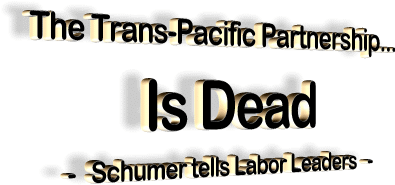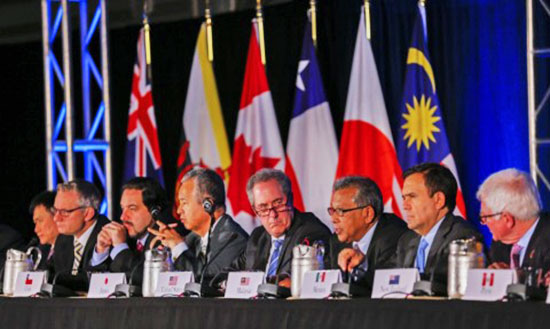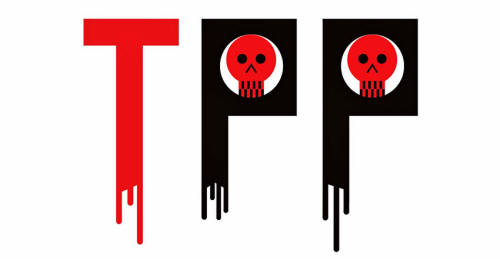|
November 10, 2016 from WashingtonPost Website
is joined by international counterparts in Atlanta after an agreement was reached by 12 Trans-Pacific Partnership member countries Oct. 5, 2015. (Erik S. Lesser/European Pressphoto Agency)
Schumer relayed statements that
Republican congressional leaders had made to him, according to an
aide who confirmed the remarks.
And Donald Trump's triumph in the presidential race cemented its fate.
have come up with a trade deal after years of negotiations. But what's in it, who hates it, and what happens next?
(Gillian Brockell/The
Washington Post)
Only 28 of 188 House Democrats and 13 of 44 Senate Democrats supported granting Obama the authority to negotiate and finalize a deal last year. And Trump's rise has decimated support for free trade among Republicans.
A former U.S. trade
representative, Sen. Rob Portman of Ohio, said he would oppose the TPP as he campaigned for reelection this year.
And he said it's up to Trump whether any trade deal would move forward after that.
House Speaker Paul D. Ryan (R-Wis.), who has supported past trade
deals, has said that "the votes aren't there" in the House to pass
the TPP in its current version and that he has no plans to bring it
to a vote in the House.
The TPP had promised to slash tariffs on U.S. agricultural goods in large markets such as Japan and Vietnam, as well as eliminate agricultural subsidies that gave competitors in the trade bloc an edge.
Warner said the TPP would exponentially increase pork exports, translating into more American jobs.
Retailers had also largely thrown their support behind TPP, as it would have reduced tariffs on many goods that brands source from overseas.
President Obama had even used Nike's Oregon headquarters as backdrop for a speech defending his trade policy.
David
French said he believes that the reduction in tariffs would have
been passed on to consumers in the form of lower prices. Tariffs on
footwear can be as high as 67.5 percent, according to the NRF, while
apparel tariffs can be up to 32 percent.
...sent letters to each member of Congress to urge them to support the TPP.
The letter said the agreement would remove $2.8 billion in duties on U.S. imports of clothes, shoes and travel items such as backpacks.
They called it,
Correction:
A previous version of this story misstated the estimated
dollar value of the duties on clothes and related items for
retailers. It is $2.8 billion, not $2.8 million.
...Known as the TPP - is Finally
Dead
from
ActivistPost Website
Lawmakers from both sides of the aisle announced the much-maligned, so-called 'free trade' deal - which would have inextricably tied the U.S. to Asia and given corporations unprecedented powers over governments - would not be pursued in the lame duck session before President-elect Donald Trump takes office.
President Obama had hoped the massive, 12-nation agreement would come to fruition under a Hillary Clinton presidency, but with her defeat and Trump's promise to roll back the previous, similarly-modeled North American Free Trade Agreement (NAFTA), all prospects of passage melted away. Further, the deal's secreted negotiations and WikiLeaks' publishing of enormously controversial sections - such as the Intellectual Property chapter - left the American public leery and increasingly contemptuous of what, in essence, constituted a gigantic corporate power-grab.
Aware of growing skepticism among voters, Republicans previously supporting the TPP dialed back their enthusiasm in recent months.
As the Wall Street Journal reports,
Despite going out with just a fizzle, the death of the TPP is no less a victory for the people.
Although it will await Trump once he takes the White House in January, it's doubtful the new president - who may, indeed, tone down previous radical ideas to better attune to the establishment - would revive the abominated deal.
In the statement cited by the WSJ, Rep. Kevin Brady said Wednesday,
Clamoring but failing to be included in the deal in the months leading up to the U.S. election, China could now continue its current path spurning American involvement in its trade and economy.
In fact, as nations in the Asia-Pacific region continue to foment an alliance both amongst themselves and with Russia, further tariff-eliminating trade deals aren't likely to include the U.S. at all.
In the upcoming Asia-Pacific Economic Cooperation (APEC) summit, Chinese President Xi Jinping will reportedly seek trade arrangements with less strictures than had been included in the TPP, such as,
Additionally, the Regional Comprehensive Economic Partnership (RCEP), which includes,
...also presents direct competition for the Trans-Pacific Partnership, Business Insider reports.
Beijing feared U.S. protectionism under the TPP would cause economic isolation in the region, but the death of the agreement - and warming alliances with its neighbors - offers a chance for China to fully assert dominance it has been building financially and militarily.
Repercussions from the presidential election echo on the opposite side of the globe as well, as negotiations for the European-focused parallel trade deal, the Transatlantic Trade and Investment Partnership (TTIP), also came to a screeching halt.
Whether or not U.S. officials will begin to switch focus from the international to the domestic in the coming administration has yet to be seen, but the predicted death of the TPP certainly portends that possibility.
Trump's sometimes vitriolic rhetoric apparently did not spark sufficient malaise for voters soured on the TPP and other proposed trade deals once he denounced the plans as special interests attempting to "rape" the country, as the WSJ noted.
As with quickly heightening tensions and utter unpredictability trailing the election of a non-politician to arguably the seat of highest power on the planet, the killing of the TPP only occurred for the odd turn of events.
Its abrupt and inelegant demise - however it came about - will undoubtedly be welcome news for many.
|



